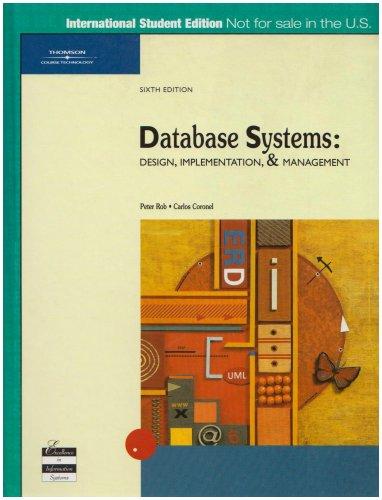Question
**** Kindly read well and choose the answers accordingly **** QUESTION 1 Policies (of policies and procedures) are: Statements from an organization addressing a specific
**** Kindly read well and choose the answers accordingly ****
QUESTION 1
Policies (of policies and procedures) are:
- Statements from an organization addressing a specific issue.
- Ignored by most employees.
- Not generally contained in the Employee Handbook.
- The same as procedures.
- Seldom ensure employee dignity and respectful treatment.
QUESTION 2
Investigators will:
- Take charge of the scene and direct all activity.
- Take direction from the first responder.
- Take their time responding to the scene.
- Discard evidence seized by anyone but themselves.
- Ignore the first responder and start over.
QUESTION 3
Crime scene technicians are (choose all that apply):
- Always experts in crime scene photography.
- Considered the most glamorous positions in criminal investigations.
- Highly trained in the collection of evidence.
- Only sworn members of law enforcement agencies.
- Possibly unsworn positions in a law enforcement agency.
QUESTION 4
A hacker is:
- Always apolitical.
- Always unknown to the victim.
- A malicious user who gains access to an information system belonging to someone else.
- Always someone with bad intent.
- Always under twenty-one years old by definition.
QUESTION 5
Sworn law enforcement officers:
- Generally take an oath to uphold the law, have the power of arrest, but do not carry a firearm.
- Generally don't take an oath to uphold the law, have no power of arrest, and do not carry a firearm.
- Generally don't take an oath to uphold the law, have no power of arrest, but do carry a firearm.
- Generally take an oath to uphold the law, have the power of arrest, and carry a firearm.
- Generally take an oath to uphold the law, have no power of arrest, and do not carry a firearm.
QUESTION 6
Data may be exfiltrated by (choose all that apply):
- Cloud accounts.
- Remote access.
- Peer-to-peer sharing sites.
- Printed documents.
- USB devices.
QUESTION 7
To be an effective digital investigator, one must (choose all that apply):
- Be terrified of testifying.
- Understand how data is saved.
- Understand how data is created.
- Be able to forensically preserve data.
- Understand how data is shared.
QUESTION 8
'Bagged and tagged' refers to:
- The celebration of the crime scene team after a success.
- Catching a speeder on the highway.
- The duties of a crime scene technician.
- Evidence seized and placed in the appropriate container.
- A suspect caught red-handed at the scene.
QUESTION 9
Digital forensics is (choose all that apply):
- About finding the digital artefact to the exclusion of all else.
- A division of forensics involving the recovery and analysis of data recovered from digital devices.
- The formal examination and analysis of digital evidence.
- Formerly, a synonym of computer forensics.
- Involved with all devices that store analog data, excluding those with analog and digital data.
QUESTION 10
Stalking is:
- Usually about victimizing men.
- Not a result of online anonymity.
- A low-impact crime.
- Easy to prove with digital evidence.
- Considered a crime.
QUESTION 11
Yellow crime scene tape is:
- Used to eliminate the need to monitor the scene.
- Used to keep criminals on the scene.
- Not used in real life, unlike in TV crime shows.
- A recognizeable barrier.
- A worthless thin piece of plastic.
QUESTION 12
The hardest part of the field may be:
- Speaking in front of a large group while answering tough questions.
- Remembering your password.
- Staying alert.
- Having work/life balance.
- Missing lunch.
QUESTION 13
The person in charge of the crime scene should:
- Watch a lot of CSI: Miami reruns.
- Improvise on procedures around evidence corruption.
- Have knowledge of the fragility of digital evidence.
- Be vigilant against reporters.
- Know everything about digital evidence.
QUESTION 14
A digital forensic investigator should:
- Treat every empoloyee misconduct investigation as if it may go to court.
- Ignore statutory requirements and take direction from the employer.
- Treat the most egregious policy violations as if they may go to court.
- Always make the decision about whether to notify law enforcement in an employee misconduct investigation.
- Override the organization's legal counsel as he or she sees fit.
QUESTION 15
The way to get better in the digital forensics field is to (choose all that apply):
- Take training.
- Avoid going to industry seminars.
- Fail miserably in court.
- Practice by conducting real and mock examinations.
- Reach out to your peers for advice.
Step by Step Solution
There are 3 Steps involved in it
Step: 1

Get Instant Access to Expert-Tailored Solutions
See step-by-step solutions with expert insights and AI powered tools for academic success
Step: 2

Step: 3

Ace Your Homework with AI
Get the answers you need in no time with our AI-driven, step-by-step assistance
Get Started


